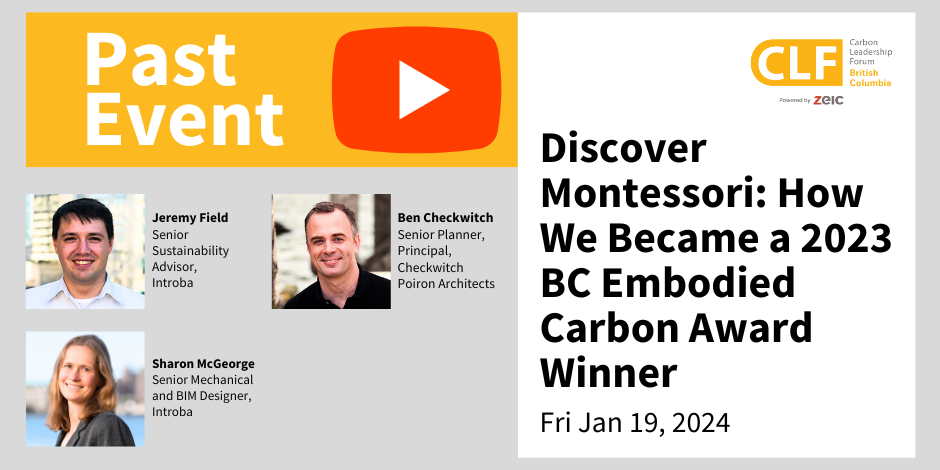Improving How We Baseline Embodied Carbon

Responding to the SE 2050 Challenge
January 21, 2021
Circular Design in the Built Environment
September 9, 2021
PAST EVENT: The City of Vancouver has set a bold policy for new buildings and construction projects to achieve a 40% reduction in embodied carbon by 2030, relative to a 2018 baseline.
Green building certification programs such as LEED v4.1 MRc1, CaGBC Zero Carbon Building, and ILFI Zero Carbon Certification also measure embodied carbon based on the percentage reduction achieved relative to a baseline.
The question is, how do we define the “baseline”?
If the baseline scenario is defined with implausibly high embodied carbon, the calculated percentage reductions would be artificially high. We need better guidance on how we define baselines in Whole Building Life Cycle Assessments (LCA) to reduce the potential for “gaming the baseline”.
What are the best practices in defining baselines? Should we define material assumptions to be used in the baseline definition? If so, what should they be? How do we determine what is a “functionally equivalent” baseline?
This event will be different from our previous events, as we don’t have experts presenting answers to these questions. Instead, this will be a facilitated technical group discussion where we explore these questions and collect all of your feedback. This feedback could potentially influence future guidance that the City of Vancouver would provide on embodied carbon baseline definition.
Please join us for what is sure to be an insightful discussion, where you will get a chance to share your expertise and learn from others.
This event is open to all who are interested, including those based outside of Vancouver. Given the nature of the discussion, we would particularly like to invite those who have experience working on embodied carbon (e.g. LCA practitioners, architects, engineers, sustainability consultants, policymakers, etc.).
Host:
Anthony Pak, Principal at Priopta and CLF Global Hub Director
Anthony is the Principal at Priopta, a firm with deep expertise in Life Cycle Assessment (LCA) for buildings. Priopta supports design teams in reducing embodied carbon on construction projects and works with leading organizations and jurisdictions to develop effective embodied carbon policies. Anthony is also the founder of CLF Vancouver—the first local hub of the Carbon Leadership Forum—which organizes local events that empower industry professionals to radically reduce embodied carbon from buildings and infrastructure. Since 2019, CLF Vancouver has inspired over 30 other cities to start CLF local hubs. He now also serves as the CLF Global Hub Director, working to support the growth and impact of CLF hubs around the world.
Speakers:
Different from our previous events, we didn't have experts presenting answers here. Instead, this was a facilitated technical group discussion where we explored some of the questions below and collected feedback.
Along with the video above, feedback was captured via:
- Mentimeter (PDF: https://bit.ly/3vzrpvl/
- Excel: https://bit.ly/3vBtAP6)
- Per-Breakout Room Google Docs (https://bit.ly/3cRdfzo)




